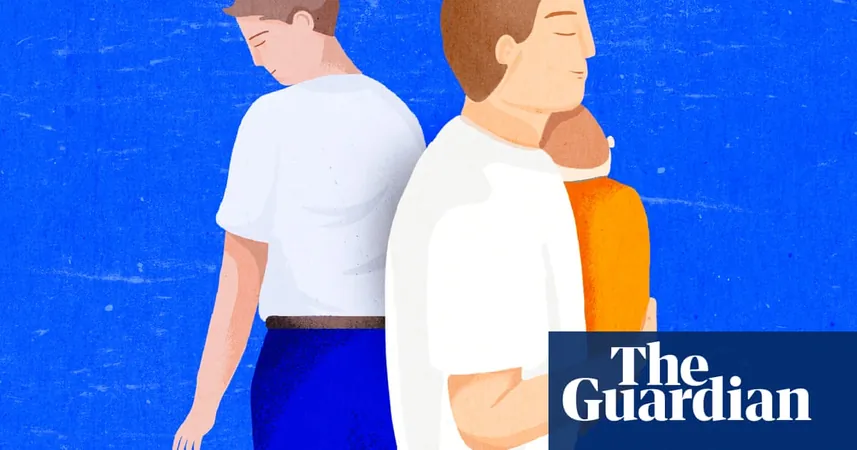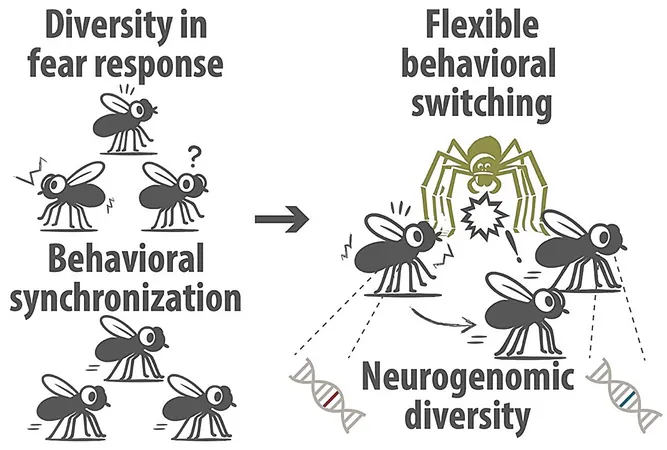
Are New Dads Being Left Behind? The Unseen Struggles of Fatherhood
2025-06-01
Author: John Tan
The Unspoken Truth About New Fatherhood
Dean Rogut was trying to hold it all together. Becoming a father for the first time is stressful enough, but for him, it took an unexpected and challenging turn. His wife's pregnancy was complicated—put on bed rest at 12 weeks and their son, Max, arrived at just 24 weeks. Each day in the NICU was fraught with uncertainty, and while he focused on supporting his wife, Rogut found himself feeling increasingly detached from his own emotions.
As they navigated the hospital's ups and downs, nobody asked how he was holding up. The focus was solely on 'how's mom doing?' He felt isolated and overwhelmed, something many new fathers experience yet seldom discuss. After nearly four months, with their son finally home, Rogut seemed to be managing, but when the holiday season hit, the reality of his struggle came crashing down—he became clinically depressed.
Why Aren’t We Talking About Father's Mental Health?
For decades, the focus has largely been on maternal mental health, recognizing that up to 20% of mothers experience perinatal anxiety or depression. As a result, healthcare systems routinely screen mothers, but there's a glaring omission: fathers are largely overlooked. Research shows that roughly 10% of fathers also grapple with significant mental health issues during this pivotal time.
Associate Professor Jacqui Macdonald from Deakin University highlights the systemic failure, pointing out that fathers are often expected to be a support system for mothers but receive little to no support themselves. This lack of consideration can leave fathers like Rogut feeling unseen and unsupported, sometimes leading to serious emotional turmoil.
The Emotional Isolation of New Dads
New dads in Australia—and across the globe—often feel isolated, battling their own challenges of identity, partnership dynamics, and financial pressures. Dr. Sharin Baldwin’s research from the UK echoes this sentiment, showing that many men feel invisible during the perinatal period. For many, the transition into fatherhood is daunting, and they often suffer in silence.
Macdonald emphasizes that the family operates as a cohesive unit. If the father is struggling, it impacts the functionality of the whole family. Better support for fathers could strengthen their roles and enhance care for both mothers and children.
A Cultural Shift Is Needed
Fathers are now expected to engage more actively in parenting, aiming for egalitarian roles, yet societal expectations still lag behind. As Associate Professor Richard Fletcher notes, while couples often share desires for equal parenting, the surrounding systems remain antiquated. Men, traditionally socialized to be less nurturing, often need clearer guidance on their roles and responsibilities.
Society hasn’t caught up to the evolving expectations of fatherhood, leaving many dads feeling unsure and unsupported.
Breaking the Silence: A Call to Action
Fletcher argues for basic systems changes, like screening new fathers for mental health challenges. Initiatives in the UK started addressing fathers’ mental health, but broader cultural acceptance is still needed. Too often, when asked how they are doing, fathers put aside their own feelings to focus on their partners, often thinking, 'No, look after her.'
This tendency to prioritize their partner's needs can be detrimental, highlighting the urgent need for services tailored specifically for fathers. Innovative programs, like mood tracking apps, show promise in helping fathers cope while also improving relationships with their partners and children.
Looking Back: What Could Have Been Different?
Dean Rogut now advocates for perinatal mental health services in his community, reflecting on his past struggles. With his son now a teenager, he wonders how different his experience would have been if society recognized that fathers also need help. 'I don't think I would have ended up in the hospital, to be honest,' he shares. If only he’d received the support he needed earlier on.
His story is a reminder that when we focus on the struggles of fathers, we begin to address the holistic health of the entire family. The time for a shift in how we perceive and support fatherhood is now—let's not let any parent feel invisible.



 Brasil (PT)
Brasil (PT)
 Canada (EN)
Canada (EN)
 Chile (ES)
Chile (ES)
 Česko (CS)
Česko (CS)
 대한민국 (KO)
대한민국 (KO)
 España (ES)
España (ES)
 France (FR)
France (FR)
 Hong Kong (EN)
Hong Kong (EN)
 Italia (IT)
Italia (IT)
 日本 (JA)
日本 (JA)
 Magyarország (HU)
Magyarország (HU)
 Norge (NO)
Norge (NO)
 Polska (PL)
Polska (PL)
 Schweiz (DE)
Schweiz (DE)
 Singapore (EN)
Singapore (EN)
 Sverige (SV)
Sverige (SV)
 Suomi (FI)
Suomi (FI)
 Türkiye (TR)
Türkiye (TR)
 الإمارات العربية المتحدة (AR)
الإمارات العربية المتحدة (AR)